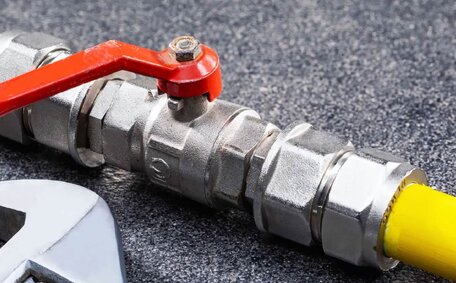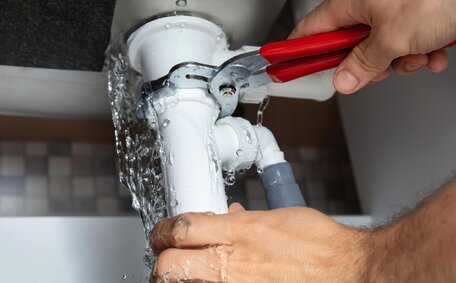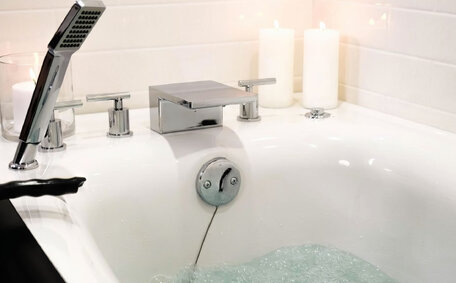Assess the Situation and Locate Valves
In a plumbing emergency, immediately assess the situation and locate the main water valve. This valve enables you to halt your water supply, preventing further water damage to your home.
Take note of where water is leaking and whether it involves any of your water heaters, a burst pipe, sewer drainage issue, or gas leak.
Knowing each water fixture’s shutoff valves is essential not only for routine plumbing issues but also for significantly reducing damage in emergencies. Identify valves for critical fixtures such as toilets, sinks, washing machines and dishwashers to swiftly shut off water to specific areas. This allows you to shut off water directly to the affected area, preserving normalcy in other parts of the home.
Consider area-specific factors such as severe weather, which can cause frozen pipes, or chemical drain cleaners that could exacerbate plumbing issues. Keep a plumbing emergency kit ready, equipped with critical items like gloves, goggles, and towels for a quick and effective response.
Once the situation is assessed and priority valves located, shut off water supply and contact your plumber right away. Immediate action is imperative to avoid flooding, mould, property damage, and other serious consequences.
Protect Yourself with Safety Gear
During plumbing emergencies, ensure you have essential protective gear on hand to prioritise safety.
Wear thick rubber gloves to protect your hands and arms from hot water scalds, chemicals, sharp pipes, and other dangers. Wearing appropriate personal protective equipment, including safety glasses, shields your eyes from harmful drain cleaners and debris.
For chemical leaks, a face mask helps prevent inhalation of toxic fumes. Knee pads cushion falls on wet floors, while rubber boots keep feet dry. Waterproof headlamps improve visibility in dim, cramped spaces.
It’s important to avoid direct contact with floodwaters, as contaminated water can cause illness, and beware of gas leaks, exposed wires, or broken glass. Before entering the affected area, ensure electricity and gas systems are turned off to prevent damage, and don’t act until these systems are safely shut off. Call emergency services for serious situations.
Isolate the Problem by Shutting Off Water
When comes to facing a plumbing emergency, The first critical step is to locate and shut off the main water supply, then call a local plumber to prevent the issue from worsening. This isolates the problem by cutting off water supply to your entire home, thereby preventing further damage.
Being aware of your main water valve’s location before emergencies ensures you can act quickly to limit flooding and water damage. The valve is typically found near your water metre or hot water system.
After turning off your home’s main water, contact your plumber to target repairs to specific areas using individual valves, like sinks or toilets, if the issue is isolated. This avoids unnecessarily cutting water to parts of your home that are not affected.
Follow plumbing safety tips like wearing gloves for protection when operating valves. Check for any remaining water flow once main supply is shutoff. Use towels to absorb excess water and prevent the onset of water damage in your home.
Keep your family clear of the affected area while waiting for the plumber. Shutting off the main valve is instrumental in controlling the emergency until professional help arrives.
Deal with Any Remaining Water
Even after shutting off the main water supply, you may need to manage residual water leaks. Use towels to soak up excess water on floors and walls. Place towels around pipes or fixtures to soak up any leakage before repairs are conducted.
In cases of significant standing water, quickly remove it with a wet/dry vacuum. Soak up any excess water from carpets as soon as possible with a carpet cleaner to prevent mould concerns.
Utilise rubber boots and gloves during cleanup to avoid slips and direct contact with contaminants. Work carefully to avoid electrocution hazards and wipe up any spilled chemicals completely.
Avert potential property damage by deploying fans to extract moisture, airing out rooms by opening windows, and removing damp sections of walls or floorings when necessary. Document damage through photos for insurance claims.
Continue to clean up seepages and keep your family away from unsafe areas until emergency repairs can begin. Swift water extraction can help prevent costly repairs until underlying issues are resolved.
Call a Professional Plumber
There are certain major plumbing emergencies that require you to call plumber specialists for assistance. Expert assistance is often required for situations involving gas leaks, sewer line blockages, burst pipes, or extensive flooding.
For urgent issues in the Mosman area, contact local experts at Mosman Plumbing on 1300 349 338 or email [email protected] for professional assistance. With extensive experience handling residential plumbing emergencies, they can promptly assess the situation and execute appropriate repairs.
Mosman Plumbing can swiftly address common issues like clogged drains, hot water system installations, leak detection, and backflow prevention, among others. Their skilled technicians offer a range of plumbing services, including equipment, materials, and training to quickly stop leaks, extract water, clear blockages, replace piping, and restore full water service.
When it comes to plumbing complexities, being able to turn off the main takes the burden off homeowners during stressful events. It can help minimise property damage, resolve dangerous gas buildups, prevent mould or contamination concerns, and avoid electrocution risks. Timely emergency plumbing support is a priority of Mosman Plumbing to ensure the safeguarding of your home and family.
Prevent Damage to Property
It’s crucial to call professional help when facing a plumbing emergency to protect your property from avoidable harm while awaiting repairs. Start by clearing floors and securing rugs to prevent slips, falls, or obstruction of access.
Move furniture and valuable items to prevent water damage where possible. Use waterproof coverings like tarps or plastic sheeting to shield surfaces. Raise electronics and appliances from the floor and unplug them to mitigate electric shock hazards.
Use caution tape or barriers to block off access to dangerous leak areas. Divert foot traffic to prevent contact with wet areas prone to mould growth. Ensure walkways are well-lit with battery powered lamps.
Document damage for insurance claims by photographing impacted areas prior to cleanup or demolition. Take detailed notes listing affected materials and possessions for assessors.
Carry out interim repairs such as sealing pipe fractures with epoxy putty when safe to do so. Extract any standing water promptly using a wet/dry vac.
While awaiting the arrival of a professional emergency plumber, continue monitoring trouble spots vigilantly. Protecting belongings and preventing individuals from danger zones can help fix problem areas that could damage your home, providing control until thorough repairs are completed.
Practice Electrical Safety
When water and electricity mix, safety must be the top priority. If water has pooled near outlets or appliances during a plumbing emergency, immediately turn off power at the circuit breaker or fuse box when attempting cleanup or repairs.
Standing in water while using electronics poses serious risks of electrocution at all times. Unplug appliances and switch off breakers supplying power to affected areas until electrical systems can be inspected by professionals.
Use extreme caution when working around wiring, outlets near leaks, or submerged electrical components. Assume all water-damaged items could shock or electrocute if turned on. Let technicians check electrical integrity first.
Wear insulated gloves and shoes during emergency response and cleanup. When using electrical devices in damp environments, opt for battery-powered lighting until power is restored to ensure safety. Mark off hazardous electrical zones with warning signs to prevent accidents.
Our team emphasises that getting electrical supplies switched off promptly before handling plumbing emergencies can save lives. Take no risks where water and power meet. Allow qualified electricians to thoroughly evaluate systems prior to reactivation after leak emergencies.
Have an Emergency Preparedness Plan
Having an emergency preparedness plan, including knowing how to secure your water supply, is vital when dealing with plumbing emergencies in your Mosman home. This plan should include having more than just emergency contacts, including our team at Mosman Plumbing who can tackle a blocked drain; call us on 1300 349 338, and ensure access to essential safety gear.
Teach all household members how to use shutoff valves to cut the water supply and how to contact a plumber in the event of an emergency. Your plumbing emergency kit should include essential tools and equipment like gloves, goggles, towels, and a plunger to facilitate an urgent response.
Also useful are battery powered lamps, a fire extinguisher, first aid resources, alternate water supplies, and backup power options in case issues knock out utilities.
Familiarity with your plumbing system’s layout, previous repairs, warranties, and serial numbers can expedite a plumber’s response.
Regularly conduct safety drills to prepare your family for plumbing crises such as burst pipes, gas leaks, sewage backups, or overflowing appliances.
Educating household members on handling plumbing emergencies and providing the necessary equipment can reduce panic and property damage. Being ready to respond swiftly and safely makes all the difference.






